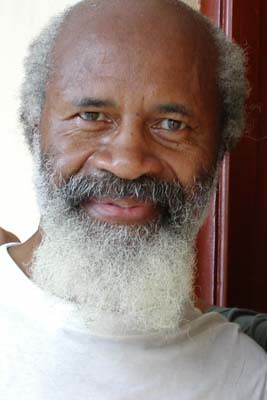ONE MONTH FOR HISTORY;
12 MONTHS FOR BASKETBALL
How I would love to step into a graduating, high school class and ask the students if they know who Marcus Garvey was. I suspect one or two could give me an answer.
Then I would ask if they knew who Paul Robeson was. It's possible I could get one answer.
Then I would pull this one out of the bag. Who was Robert J. Williams?
Robert J. who?
How well I remember Radio Free Dixie, broadcasting from Havana in the early sixties, the one-hour program filled with jazz and the defiant voices of Mabel Williams and her husband Robert J. Williams, coming through my Grundig radio, strong and clear. Broadcasting on 50,000 watts, Radio Free Dixie could be heard on the West Coast of the US, until the Cuban government exercised their displeasure by cutting it to about 50 watts, if memory serves.
"Radio Free Dixie," Mabel Williams would say, "invites you to listen to the free voice of the South. Stay with us for music, news and commentary by Robert F. Williams." It is not difficult to remember Williams's booming sign-off, the drums still pulsating: "Freedom, Freedom Now, or Death!"
I would tell them about this black man from Monroe, North Carolina in the Fifties, who confronted racism head one, usually a .45 in his waist, and sometimes a rifle or two in his car, and quite a few guns, rifles in his home. The dynamite would be stored outside.
A former Marine, Williams taught his wife and two young boys to shoot. Those were the days in Dixie when Blacks had zero rights, where the sidewalks weren't paved in their section, and when blacks walked in the street to leave the sidewalks free for whites.
After many summers of protests a black man, Elgie Gray, was finally hired as a policeman. Denied the use of a patrol car, Gray said: "I was told that I wasn't allowed to arrest a white person."
Summer after summer, Williams led the struggle to integrate the public pool, without success. An official explained why: "To allow negroes to swim even once a week would be too expensive because the water would have to be changed after the colored people had used it."
I would tell the students that Robert F. Williams, President of the Monroe branch of the NAACP, was suspended by the national office, headed by Roger Wilkins, who despised him, for advocating self-defense.
Robert F. Williams was a friend of Fidel Castro, Che Guevara, Juan Almeida Bosque (the Afro Cuban commander of the Cuban Army), Ho Chi Minh, Mao tse Tung, Chou en Lai, as well as a string of Americans and Canadians, many of whom were white and who helped him escape to Cuba, through Canada, when the government went after him on trumped-up charges of kidnapping.
I would tell them that Robert F. Williams was a rare, black freedom fighter and leader during the civil rights movement in that, for a man on the forefront of the right to vote, the right to integrate public facilities, who managed to die in his bed, at age 71, in 1996.
The Black Panthers were inspired by him in their approach to arming themselves; Imira Baraka credited him for his political awakening. A few of the people he inspired along the way.
I bought the book, Radio Free Dixie, on 21 April 2000, and just read it. Compelling!
PBB
Friday, June 18, 2004
Subscribe to:
Post Comments (Atom)

No comments:
Post a Comment